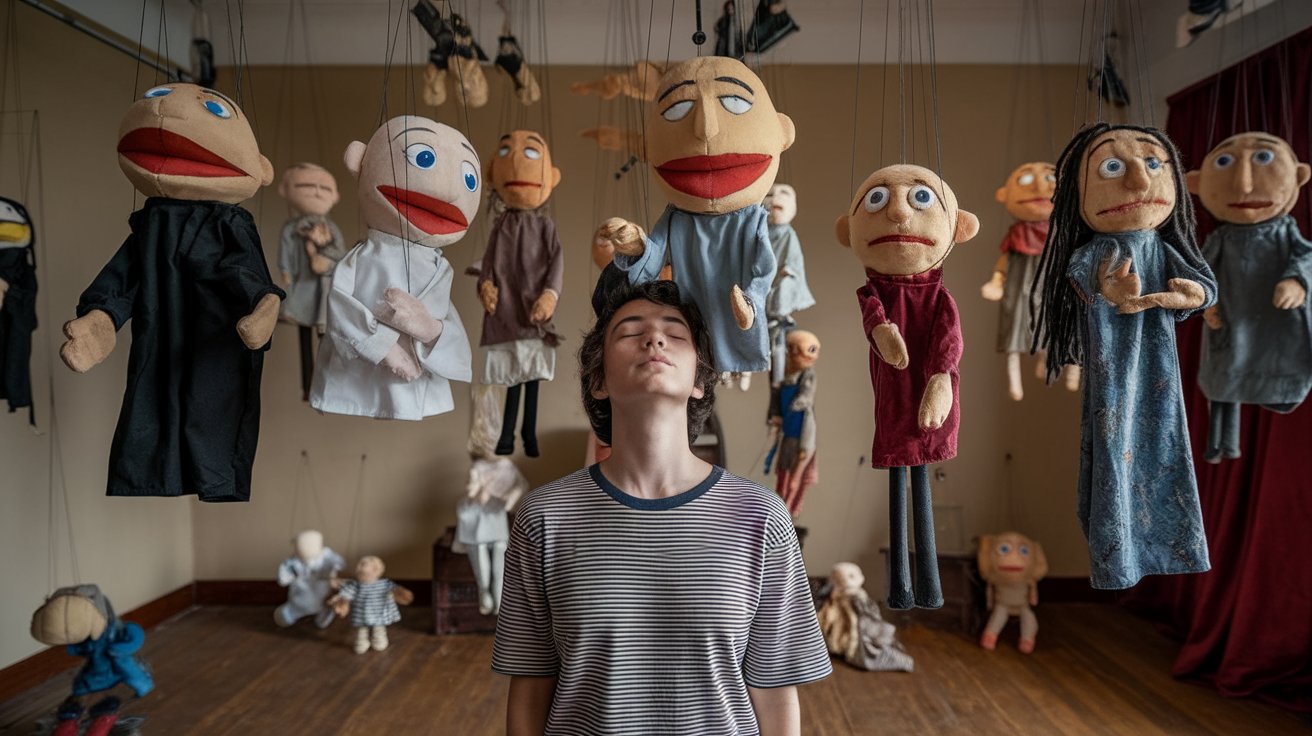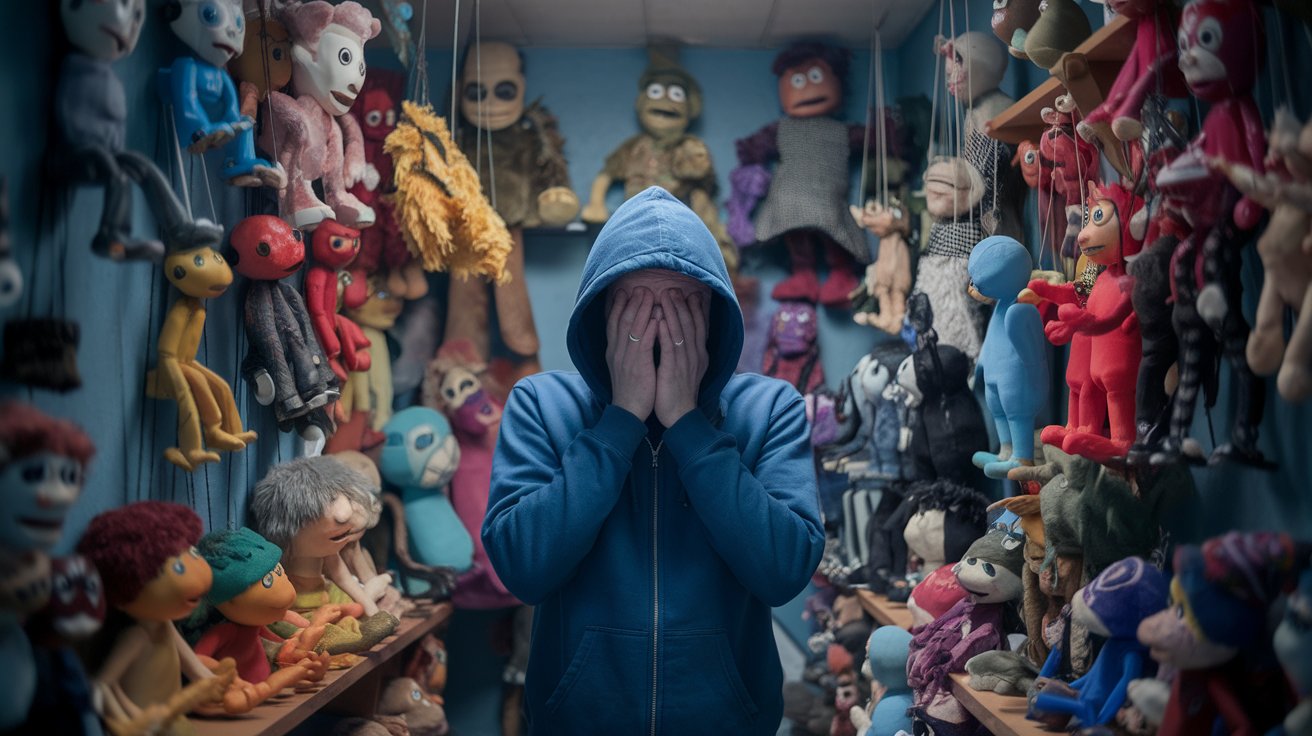
Puppets have long been a part of human culture, entertaining and educating people of all ages.
For most, these animated figures bring joy and laughter. However, for some individuals, puppets evoke an intense, irrational fear known as pupaphobia.
This specific phobia can significantly impact a person’s life, limiting their engagement with certain forms of entertainment, cultural experiences, and even social interactions.
Puppets appear in various contexts, from children’s shows to sophisticated theater productions, making this fear particularly challenging in modern society.
In this article, we’ll explore the nature of pupaphobia, its potential causes, and how it affects those who experience it.
We’ll also discuss strategies for managing this fear and treatment options available for those seeking to overcome it.
Understanding Pupaphobia

Pupaphobia is the intense fear of puppets.
This specific phobia can cause significant distress for those affected, as puppets are often used in entertainment, education, and even therapy.
To better grasp this condition, let’s explore its nature and common triggers.
Pupaphobia falls under the category of specific phobias in anxiety disorders.
It’s characterized by an excessive and irrational fear of puppets that goes beyond normal discomfort.
Due to their similar qualities, this fear can extend to similar objects like dolls, marionettes, or ventriloquist dummies.
People with pupaphobia may experience anxiety or panic when encountering puppets in various settings, from children’s shows to cultural performances.
Depending on the individual and the specific situation, the intensity of the fear can range from mild unease to severe distress.
1. Common Triggers
Several aspects of puppets can trigger anxiety in someone with pupaphobia:
- Movement: The lifelike yet unnatural movements of puppets
- Appearance: The uncanny resemblance to living beings while clearly being artificial
- Sound: The often exaggerated or artificial voices associated with puppets
- Context: Unexpected encounters with puppets in various settings
Some individuals may be more sensitive to certain types of puppets or specific puppet-related situations.
For example, one person might feel anxious about hand puppets, while another might be more troubled by larger marionettes.
2. The Uncanny Valley Effect
The “uncanny valley” effect plays a significant role in pupaphobia.
This concept refers to the feeling of discomfort or eeriness caused by things that appear almost, but not exactly, like natural beings.
Puppets often fall into this category, as they mimic human or animal characteristics but remain clearly artificial.
This effect can make puppets particularly unsettling for some people, triggering feelings of unease or fear.
The more lifelike the puppet, the more pronounced this effect can be, potentially intensifying the phobic response.
Understanding pupaphobia involves recognizing these various factors that contribute to the fear.
By acknowledging the complex interplay between visual perception, personal experiences, and psychological responses, we can better comprehend why puppets can evoke such strong reactions in some individuals.
Causes of Pupaphobia
Pupaphobia, like many specific phobias, can develop due to various factors.
Understanding these potential causes can help in addressing the root of the fear and finding appropriate treatment methods.
Let’s explore some of the common causes and contributing factors to pupaphobia.
1. Childhood Experiences
Early encounters with puppets can play a significant role in developing pupaphobia:
- Frightening puppet shows: A child may have been startled or scared by an unexpected or intense puppet performance.
- Negative associations: If puppets were present during a traumatic or stressful event, a child might develop a lasting fear.
- Misunderstanding of puppets: Young children who don’t fully grasp the concept of puppets being controlled by humans might find them unsettling or threatening.
2. Media Influence
Movies, TV shows, and other media can contribute to the development of pupaphobia:
- Horror films featuring evil dolls or puppets
- Unsettling puppet characters in children’s shows
- News stories or urban legends about haunted dolls or puppets
Exposure to such content, especially at a young age, can create a strong negative association with puppets.
3. The Uncanny Valley Effect
As mentioned earlier, the uncanny valley effect can be a significant factor in pupaphobia:
- Cognitive dissonance: The brain struggles to categorize puppets as either living or non-living, causing discomfort.
- Evolutionary response: Some theories suggest that the uncanny valley effect might be an evolved response to potential threats or disease carriers.
4. Underlying Anxiety Disorders
Pupaphobia might sometimes be a manifestation of broader anxiety issues:
- Generalized anxiety disorder: People with GAD might be more prone to developing specific phobias.
- Social anxiety: Fear of puppets could be linked to concerns about social situations where puppets might be present.
5. Learned Behavior
In some cases, pupaphobia can be a learned response:
- Observing others: A child might develop a fear of puppets after seeing a parent or caregiver display anxiety around them.
- Cultural influences: In some cultures, puppets might be associated with spiritual or supernatural beliefs, potentially contributing to fear.
6. Traumatic Experiences
While less common, traumatic experiences involving puppets or puppet-like figures could lead to pupaphobia:
- Accidents during puppet shows
- Being frightened by someone wearing a costume or mask that resembled a puppet
Understanding these potential causes is crucial in addressing pupaphobia effectively.
It’s important to note that the exact cause can vary from person to person, and in many cases, it might be a combination of several factors.
Identifying the specific triggers and underlying causes for an individual can greatly assist in developing a targeted treatment approach.
Symptoms and Impact on Daily Life
Pupaphobia can manifest in various ways and significantly affect a person’s daily activities.
Understanding the symptoms and potential impacts can help individuals recognize the condition and seek appropriate help.
Let’s explore the common symptoms of pupaphobia and how it can influence different aspects of life.
1. Physical Symptoms
When confronted with puppets or in situations where puppets might be present, individuals with pupaphobia may experience physical reactions such as:
- Rapid heartbeat or palpitations
- Sweating or clamminess
- Shortness of breath or hyperventilation
- Trembling or shaking
- Nausea or stomach discomfort
- Dizziness or lightheadedness
These physical symptoms can range from mild to severe, depending on the individual and the specific situation.
2. Emotional and Psychological Symptoms
Pupaphobia can also trigger various emotional and psychological responses:
- Intense fear or panic when encountering puppets
- Anxiety or dread when anticipating situations that might involve puppets
- Feeling of losing control in puppet-related situations
- Overwhelming desire to escape or avoid areas where puppets might be present
- Persistent worry about encountering puppets in daily life
3. Behavioral Changes
People with pupaphobia often modify their behavior to avoid or minimize contact with puppets:
- Avoiding places where puppets are likely to be present, such as children’s theaters or certain museums
- Refusing to watch TV shows or movies that might feature puppets
- Opting out of social events that could involve puppet performances
- Asking others to check for the presence of puppets before entering a new environment
4. Impact on Entertainment and Cultural Experiences
Pupaphobia can limit a person’s engagement with various forms of entertainment and cultural activities:
- Difficulty enjoying certain types of theater performances
- Avoiding children’s shows or family-friendly events that often feature puppets
- Missing out on cultural experiences that involve traditional puppet arts
- Limiting television and movie viewing options to avoid potential puppet appearances
5. Effects on Social Interactions
The fear of puppets can also affect social relationships and interactions:
- Difficulty participating in social events where puppets might be present, such as children’s birthday parties
- Strain on relationships with friends or family who don’t understand the phobia
- Embarrassment or anxiety in social situations where puppets are discussed or present
- Isolation from activities or groups that involve puppets, potentially leading to feelings of loneliness
6. Impact on Parenting or Childcare
For adults with pupaphobia who have children or work with children, additional challenges may arise:
- Difficulty engaging in certain types of play or educational activities with children
- Anxiety about attending children’s events or performances
- Challenges in selecting appropriate entertainment or toys for children
7. Occupational Limitations
In some cases, pupaphobia might affect career choices or job performance:
- Avoiding careers in education, childcare, or entertainment that might involve puppets
- Difficulty participating in certain workplace training or team-building activities that use puppets
- Stress when encountering puppets in unexpected work situations
Understanding these symptoms and impacts is crucial for both individuals with pupaphobia and their support systems.
Recognizing how this phobia can affect various aspects of life underscores the importance of seeking help and developing effective coping strategies.
Coping Strategies and Treatment Options
Managing pupaphobia often involves a combination of self-help strategies and professional treatment.
With the right approach, individuals can learn to control their fear and reduce its impact on their daily lives.
Let’s explore various coping strategies and treatment options available for those dealing with pupaphobia.
1. Self-Help Strategies
These techniques can be practiced independently to help manage symptoms:
- Gradual exposure: Slowly introducing puppet-related content in a controlled manner, starting with less threatening images or videos
- Relaxation techniques: Using deep breathing, progressive muscle relaxation, or meditation to reduce anxiety
- Mindfulness: Practicing staying present and observing thoughts without judgment when confronted with puppet-related anxiety
- Education: Learning about puppetry and how puppets work to demystify them
2. Professional Treatment Options
For more severe cases, seeking professional help can be beneficial. Common treatment approaches include:
3. Cognitive Behavioral Therapy (CBT)
CBT is often effective for treating specific phobias like pupaphobia. It involves:
- Identifying and challenging irrational thoughts about puppets
- Learning to replace negative thought patterns with more realistic ones
- Developing practical coping skills for managing anxiety
4. Exposure Therapy
This treatment gradually exposes individuals to puppets in a controlled environment:
- Starting with less anxiety-provoking situations and progressing to more challenging ones
- Using virtual reality technology for simulated exposure in some cases
- Combining exposure with relaxation techniques to manage anxiety
5. Hypnotherapy
Some individuals find relief through hypnosis:
- Accessing the subconscious mind to address underlying fears
- Reframing negative associations with puppets
- Enhancing relaxation and coping skills
6. Medication
In some cases, medication may be prescribed to help manage anxiety symptoms:
- Anti-anxiety medications for short-term relief during exposure therapy
- Antidepressants to help manage underlying anxiety or depression
7. Alternative Approaches
Some individuals find relief through alternative methods:
- Art therapy as a way to express emotions related to the fear
- Meditation and mindfulness practices to manage anxiety
- Aromatherapy or herbal remedies for general stress relief
8. Building a Support System
Having a strong support network can be invaluable:
- Joining support groups for individuals with specific phobias
- Educating friends and family about pupaphobia
- Seeking understanding and accommodation in social or work settings
9. Desensitization Techniques
Gradually becoming more comfortable with puppet-related content:
- Starting with cartoon images of puppets and progressing to more realistic representations
- Watching behind-the-scenes videos of puppeteers at work
- Handling puppet-making materials to understand their construction
It’s important to remember that overcoming pupaphobia is a process that takes time and patience.
What works best can vary from person to person, and it may take some trial and error to find the most effective combination of strategies.
For those struggling with pupaphobia, reaching out to a mental health professional can be a crucial first step.
They can provide a proper diagnosis, develop a tailored treatment plan, and offer guidance throughout the recovery process.
With the right support and approach, individuals with pupaphobia can learn to manage their fear, reducing its impact on their daily lives and opening up new opportunities for personal and cultural experiences.
Conclusion
Pupaphobia, while not as widely recognized as some other fears, can have a profound impact on those who experience it.
From its roots in childhood experiences or media influences to its wide-ranging effects on daily life, this condition presents real challenges for many individuals.
However, it’s crucial to remember that help is available.
Many people have found effective ways to manage their fear of puppets through a combination of self-help strategies, professional treatments, and gradual exposure techniques.
As we conclude, let’s emphasize the importance of empathy and support for those dealing with pupaphobia or any specific fear.

